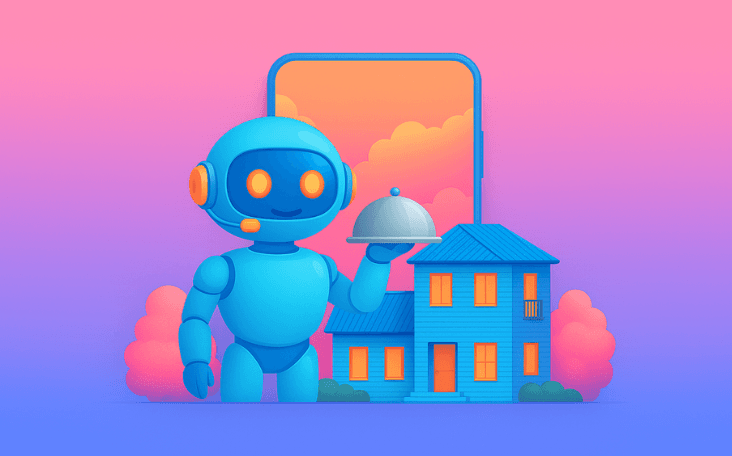Discover how conversational AI hospitality improves guest experiences, streamlines service, and cuts costs. Learn how hotels can adopt it today to stay ahead.

Akshat Mandloi
Updated on
January 27, 2026 at 5:19 PM
Guests remember how a hospitality experience made them feel. Quick help, a warm tone, and the right response at the right time often decide if they return. Hoteliers now see personalization as a key driver of revenue, and they are raising budgets to match that goal.
Guests are also clear about what they want. About 82% of consumers say they are willing to share personal data if it leads to a more useful and customized service. That makes personalization an expectation across the hospitality industry.
The way people book and interact shows the same shift. Most reservations now happen through mobile apps or websites. Travelers move fast, and they expect hotels, resorts, and other venues to keep pace with their choices and timing.
This is where conversational AI in hospitality makes sense. This article explores why it has become central to guest service and the key benefits it brings.
Personalized, Instant Service: Conversational AI helps respond to guests quickly while customizing interactions to individual preferences.
Operational Support: It handles routine queries, bookings, and multilingual communication, reducing staff workload and improving efficiency.
Revenue and Insights: AI drives smart upselling, tracks guest trends, and provides data for better decision-making.
Thoughtful Implementation: Success requires integrating AI with systems, training staff, maintaining data privacy, and continuously monitoring performance.
What is Conversational AI in Hospitality?
Conversational AI in hospitality is basically AI that talks to guests like a real staff member. It can enhance hotel customer service by answering questions, taking bookings, and guiding guests during their stay without sounding robotic.
Here’s what it actually does for your guests:
Understands what guests mean using natural language processing
Learns from past interactions with machine learning
Connects with hotel systems like booking engines and property management tools
Remembers context to keep conversations smooth and relevant
Unlike simple chatbots, conversational AI adjusts to each guest. It makes guest interactions faster, more personal, and consistent around the clock.
Also Read: How AI Voice Agents Are Transforming Real Estate Lead Handling and Scheduling
With a clear overview of what conversational AI does, it’s easier to see why hospitality businesses are investing in it. Beyond just handling chats and calls, it brings real advantages that can transform the guest experience and day-to-day operations.
Key Benefits of Conversational AI in Hospitality

Conversational AI in hospitality lets hotels deliver fast, personalized, and reliable service while supporting staff and increasing revenue. It handles routine tasks, communicates across languages, and generates insights to improve guest experiences.
Here’s a closer look at how these benefits come together.
1. Personalized Engagement
Conversational AI remembers what guests like and adjusts its responses to feel personal. Guests get recommendations, reminders, or messages that match their style.
Around 80% of hotels already use or plan to use AI and data analytics to offer personalized experiences, and conversational AI is one way they make that happen. This helps every stay feel thoughtful and unique.
2. Cost Efficiency and Scalability
Conversational AI handles routine guest questions across chat, voice, or messaging platforms, keeping service smooth even during busy times. It responds instantly, keeps guests happy, and eases pressure on the team. Over time, using AI for these tasks can cut operational costs by up to 30%.
Additionally, by 2029, agentic AI is projected to handle 80% of common customer service issues autonomously, showing how much operations can scale with automation.
3. Faster and Reliable Service
Since AI responds instantly, guests don’t have to wait, and information is always accurate. Surveys show 58% of guests feel AI improves their booking and stay experience. That kind of speed makes service feel seamless without extra staff.
4. Multilingual Support
Hotels welcome travelers from every corner of the globe, each with different languages and expectations. Conversational AI can handle multiple languages instantly, allowing guests to ask questions and receive answers in their native language.
This keeps interactions smooth and avoids confusion, so every guest feels understood and cared for.
5. Staff Productivity
With conversational AI handling routine queries, staff can focus on tasks that require human judgment. This reduces stress and allows teams to engage more meaningfully with guests. It also creates opportunities for employees to develop skills and take on higher-value responsibilities.
6. Smarter Upselling
AI suggests upgrades, promotions, and services based on guest preferences and booking history. Hotels using AI chatbots have seen upsell rates rise 15-20%, direct bookings increase 15-30%, and extra revenue grow 10-20%. Guests get offers that matter to them, and hotels earn more.
7. Data-Driven Insights
Every guest interaction generates valuable data. Hospitality businesses can track trends, identify gaps, and adjust services to improve experiences. Over time, this leads to better reviews and smarter decisions, removing the guesswork about what guests want.
Also Read: Top Use Cases and Benefits of Conversational AI in Healthcare
Understanding these benefits shows why hotels are increasingly turning to conversational AI. Let’s look at how these capabilities are applied in real-world hotel operations.
Practical Applications of Conversational AI in Hotels and Resorts
Conversational AI is now being used across multiple hotel operations, improving guest experiences and supporting staff behind the scenes. Here’s how it’s applied in real scenarios:
24/7 Guest Support and FAQs
Guests can get answers about check-in/out times, amenities, or hotel policies at any hour.
AI ensures responses are accurate and consistent across chat, voice, or messaging platforms.
Booking, Modifications, and Cancellations
Guests can make new reservations, change dates, or cancel bookings directly through chat or voice.
Reduces errors and delays by integrating with hotel management systems.
Local Recommendations
Suggests restaurants, activities, and events based on guest profiles and preferences.
Guides travelers with personalized itineraries and experiences during their stay.
Voice-Enabled Room Controls and In-Room Requests
Lets guests adjust lighting, temperature, or entertainment using voice commands.
Handles requests like extra towels, housekeeping, or other in-room services.
Feedback Collection and Loyalty Programs
Prompts guests for post-stay reviews or ratings.
Enrolls or updates loyalty program memberships automatically and notifies guests of rewards.
Staff Coordination and Internal Requests
Streamlines internal communications like task assignments or maintenance alerts.
Supports operational efficiency without overlapping with guest-facing benefits.
With all these ways AI is already shaping guest experiences, the next step is knowing how to bring it into your hotel the right way. Let’s explore how hotels can implement conversational AI successfully.
How Hotels Can Implement Conversational AI Successfully

Implementing AI voice automation in hospitality takes planning and balance. It needs teamwork, attention, and smart integration to fit naturally into daily operations. Here’s how hotels can get it right.
1. Pick the Right AI Tools
Start with the systems made for hotels. They should understand guest requests, bookings, and common interactions. Generic tools can’t handle the details, so choosing something built for hospitality makes the process smoother from day one.
2. Connect with Existing Systems
AI works best when it talks to your property management system, CRM, and booking engines. That way, it has live information on availability, guest profiles, and reservations. The system can respond accurately without staff having to repeat steps.
3. Train Staff and Blend Human Service
Team members need to understand how the AI operates and when to intervene. Combining AI responses with human interaction keeps communication natural. Staff can guide tricky situations while AI handles straightforward conversations.
4. Keep Compliance and Data Privacy in Mind
Guest information is sensitive. Hotels must follow privacy rules and protect personal data. AI should utilize encryption and secure access to ensure information remains private and guests feel safe.
5. Monitor and Update Regularly
AI isn’t something you set up and forget. Keep an eye on how it’s doing, make tweaks when needed, and update it regularly. That way, it stays reliable and ready for any guest request, no matter how simple or unusual.
Also Read: Top 10 AI Voice Agents Revolutionizing Business in 2025
Even with careful planning, implementing AI comes with its own set of hurdles. Let’s look at the main challenges hotels face with conversational AI.
Main Challenges Hotels Face with Conversational AI
Hotels can get a lot from AI, but there are some real hurdles to keep in mind. Finding the right mix, managing costs, keeping guests’ trust, and avoiding language errors are all important considerations. Here’s a simple overview:
Challenge | What It Means | Why It Matters |
|---|---|---|
Balancing Automation and Human Touch | Deciding which tasks AI handles and when staff should step in | Too much automation can feel cold; the service needs to stay personal |
Guest Trust and Transparency | Making it clear when guests interact with AI and how their data is used | Missteps can reduce confidence and hurt loyalty |
Implementation Costs for Smaller Hotels | Budgeting for AI setup and maintenance | High upfront costs can strain small properties; gradual scaling helps |
Language and Translation Accuracy | Ensuring AI understands different languages, dialects, and context | Mistakes can frustrate guests and lower the quality of experience |
After seeing the main challenges, it’s clear that hotels need a solution that is accurate, secure, and easy to integrate with daily operations. Smallest.ai provides conversational AI designed specifically to meet these needs in hospitality.
How Smallest.ai Powers Conversational AI in Hospitality
Hotels know the hurdles. Guests want quick answers, staff can only do so much, and mistakes cost trust. That’s where an AI voice agent steps in.
Smallest.ai provides enterprise-ready AI voice agents that reply in under 100 milliseconds. That speed matters when a guest calls late at night to change a booking or needs instant support in their own language. The response feels natural, not robotic.
These agents don’t get tired. They run 24/7, handling calls, confirming reservations, and managing follow-ups when staff are stretched thin. With multilingual accuracy, they make sure no guest feels left out, whether they speak English, Spanish, or Mandarin.
It’s not just about cutting costs. Hotels using Smallest.ai can scale service without losing the personal touch. The tech seamlessly integrates into existing systems, making it feel like part of the team.
Conclusion
Conversational AI in hospitality can make guest interactions smoother, streamline operations, and help hotels run more efficiently. The real impact comes when AI works alongside trained staff who know when to step in.
Hotels that start now will stay ahead in redefining guest service, and solutions like Smallest.ai make that possible by combining speed, reliability, and a natural, multilingual guest experience.
Discover how conversational AI can make guest experiences seamless - try Smallest.ai today.
FAQs
1. Can conversational AI handle seasonal fluctuations in hotel bookings?
Yes. Advanced AI can adapt to peak seasons and sudden surges in guest requests without slowing down service, ensuring guests get timely responses even during high traffic periods.
2. How does conversational AI support eco-friendly hotel operations?
AI can optimize resource usage by managing energy-consuming devices, automating reminders for lights or HVAC in unoccupied rooms, and reducing paper-based processes through digital guest interactions.
3. Can AI help with multilingual marketing or promotions?
Yes, it can generate targeted promotions, emails, or notifications in multiple languages, making it easier for hotels to reach diverse guest segments without extra manual effort.
4. How does conversational AI handle accessibility needs?
Modern AI systems can assist guests with hearing or vision impairments by offering voice, text, or screen-reader-compatible interactions, ensuring inclusive experiences for all visitors.
5. Is conversational AI useful for event or banquet management within hotels?
Yes. AI can coordinate bookings, send reminders, manage requests, and track resources for meetings, weddings, or conferences, reducing manual errors and improving internal coordination.


